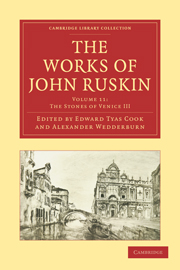Book contents
- Frontmatter
- Contents
- LIST OF ILLUSTRATIONS
- INDEX TO THE ILLUSTRATIONS
- INTRODUCTION TO THIS VOLUME
- BIBLIOGRAPHICAL NOTE
- THE STONES OF VENICE
- THIRD, OR RENAISSANCE PERIOD
- CHAP. I EARLY RENAISSANCE
- CHAP. II ROMAN RENAISSANCE
- CHAP. III GROTESQUE RENAISSANCE
- CHAP. IV CONCLUSION
- EPILOGUE—“CASTEL-FRANCO”
- AUTHOR'S APPENDIX
- Examples of the Architecture of Venice
- Venetian Index
- Plate section
CHAP. IV - CONCLUSION
from THIRD, OR RENAISSANCE PERIOD
Published online by Cambridge University Press: 07 September 2011
- Frontmatter
- Contents
- LIST OF ILLUSTRATIONS
- INDEX TO THE ILLUSTRATIONS
- INTRODUCTION TO THIS VOLUME
- BIBLIOGRAPHICAL NOTE
- THE STONES OF VENICE
- THIRD, OR RENAISSANCE PERIOD
- CHAP. I EARLY RENAISSANCE
- CHAP. II ROMAN RENAISSANCE
- CHAP. III GROTESQUE RENAISSANCE
- CHAP. IV CONCLUSION
- EPILOGUE—“CASTEL-FRANCO”
- AUTHOR'S APPENDIX
- Examples of the Architecture of Venice
- Venetian Index
- Plate section
Summary
§1. I fear this chapter will be a rambling one, for it must be a kind of supplement to the preceding pages, and a general recapitulation of the things I have too imperfectly and feebly said.
The grotesques of the seventeenth and eighteenth centuries, the nature of which we examined in the last chapter, close the career of the architecture of Europe. They were the last evidences of any feeling consistent with itself, and capable of directing the efforts of the builder to the formation of anything worthy the name of a style or school. From that time to this, no resuscitation of energy has taken place, nor does any for the present appear possible. How long this impossibility may last, and in what direction with regard to art in general, as well as to our lifeless architecture, our immediate efforts may most profitably be directed, are the questions I would endeavour briefly to consider in the present chapter.
§ 2. That modern science, with all its additions to the comforts of life, and to the fields of rational contemplation, has placed the existing races of mankind on a higher platform than any that preceded them, none can doubt for an instant; and I believe the position in which we find ourselves is somewhat analogous to that of thoughtful and laborious youth succeeding a restless and heedless infancy.
- Type
- Chapter
- Information
- The Works of John Ruskin , pp. 196 - 230Publisher: Cambridge University PressPrint publication year: 2010First published in: 1904



